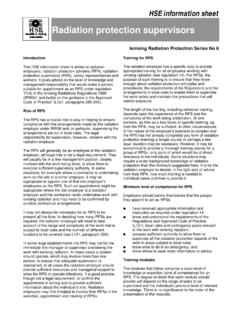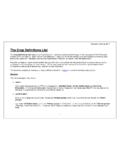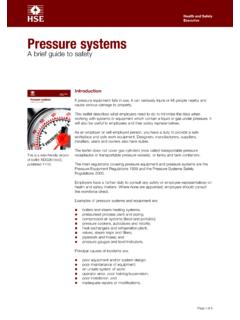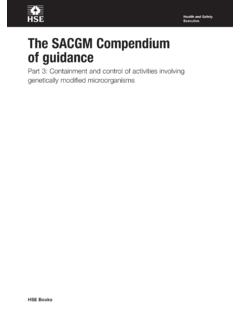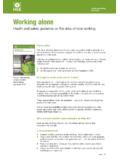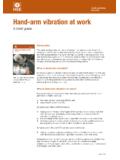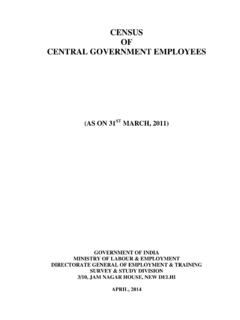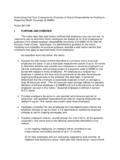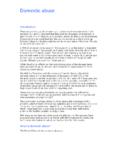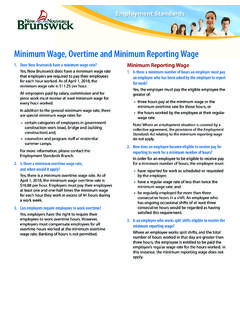Transcription of Employers’ Liability (Compulsory Insurance) Act 1969
1 Health and Safety Executive1 of 6 pagesEmployers Liability ( compulsory insurance ) Act 1969A brief guide for workers Most employers are required by the law to insure against Liability for injury or disease to their employees arising out of their employment. This guide is intended to help you to understand what is required. It is not a legal interpretation of the employers Liability ( compulsory insurance ) Act and it has no formal legal status. You should be aware that only the courts can authoritatively interpret the is employers Liability insurance ?Your employer is responsible for your health and safety while you are at work. If you are injured as a result of an accident at work, or become ill as a result of your work, and if you believe your employer is responsible, you may be able to seek compensation from them. The employers Liability ( compulsory insurance ) act 1969 requires your employer to have at least a minimum level of insurance against any such claims.
2 employers Liability insurance will cover relevant work injuries or illness whether these are caused on or off site. However, any injuries or illness relating to motor accidents which occur while you are at work may be covered separately by your employer s motor insurance . Public Liability insurance is different. It covers employers for claims made against them by members of the public or other businesses, but not for claims by employees. While public Liability insurance is generally voluntary, employers Liability insurance is compulsory . Your employer can be fined if they do not hold a current employers Liability insurance policy which complies with the my employer need employers Liability insurance ?All employers must have employers Liability insurance except the following:*most public organisations including government departments and agencies, local authorities, police authorities and nationalised industries;health service bodies including National Health Service trusts, health authorities, primary care trusts and Scottish health boards;some other organisations which are financed through public funds, such as passenger transport executives and magistrates courts you work for one of these public sector organisations, you can still claim compensation if you are injured at work or become ill as a result of your work and your employer is to blame.
3 Any compensation will be paid directly from public funds. Health and Safety ExecutiveEmployers Liability (Compulsor y insurance ) Act 1969A brief guide for workersThis is a web-friendly version of leaflet HSE39(rev2)* Further exemptions from the need to have employers Liability insurance are listed at section 3 of the employers Liability ( compulsory insurance ) act 1969 , and Schedule 2 to the 1998 Regulations. You can also get advice on this and other aspects of employers Liability insurance from your trade of 6 pagesHealth and Safety ExecutiveEmployers Liability ( compulsory insurance ) act 1969 There are also exemptions for certain family businesses. Your employer will not need employers Liability insurance to cover you if you are closely related, ie if your employer is your husband, wife, civil partner, father, mother, grandfather, grandmother, stepfather, stepmother, son, daughter, grandson, granddaughter, stepson, stepdaughter, brother, sister, half-brother or half-sister.
4 However, this exemption does not apply to family businesses which are incorporated as limited I protected if I work abroad?If you are normally based in England, Scotland or Wales (including offshore installations or associated structures) your employer must have employers Liability insurance to compensate you if you are injured at work or you become ill as a result of your employment with them. If you are based abroad you will not be covered by employers Liability insurance under the law in Great Britain. However, you should check whether the law in the country where you are based requires your employer to take out insurance or take any other measures to protect you are normally based abroad but you spend more than 14 days continuously in Great Britain, or more than seven days on an offshore installation, the law in Great Britain requires your employer to take out employers Liability insurance to cover do I find out about my employer s insurance policy?
5 When your employer takes out or renews a policy for employers Liability insurance , the insurance company will give them a certificate containing information about the policy. Your employer must display a copy of this certificate where you have reasonable access to it. If they do not, they can be 1 October 2008, employers have been allowed to satisfy this requirement by displaying the certificate electronically. If your employer chooses this method, they must ensure that you know how and where to find the certificate and you have reasonable access to it. What should I look for on the certificate of insurance ?The certificate of insurance must contain the following information:Level of cover: The certificate must show that your employer has insurance cover for at least the minimum level required by the law. At present the minimum level of cover required is 5 million, which includes costs. Your employer can have more than one policy for employers Liability insurance .
6 In this case, the total value of the cover provided by the policies must be at least 5 million. In practice, most insurance companies provide cover of at least 10 covered: The certificate should make clear which companies are covered by the policy. If the company you work for is part of a group, the policy can cover the group as a whole. In this case the group as a whole, including subsidiary companies, must have cover of at least 5 of insurer: The certificate must be signed by an authorised insurer. The Financial Services Authority (FSA) maintains a register of authorised insurers. You can check whether a company is authorised by searching their register on or telephoning the FSA s Moneymadeclear 3 of 6 pagesHealth and Safety ExecutiveEmployers Liability ( compulsory insurance ) Act 1969consumer helpline on 0300 500 5000. If the insurance policy is not with an authorised insurer or does not provide cover of at least 5 million, your employer may be breaking the if I work on an offshore installation?
7 If you work on an offshore installation or associated structure, your employer does not need to provide a copy of the certificate on every installation. However, you can ask to see a copy of the certificate and your employer must provide one within ten days of your request. employers can provide a copy electronically or by fax if this is easier. What should I do if I think my employer is breaking the law?The Health and Safety Executive (HSE) enforces the law on employers Liability insurance . Your employer may be breaking the law if:they do not have employers Liability insurance ; they have not displayed, or made available electronically, a certificate of insurance ; orthe insurance policy, or policies if there is more than one, does not provide cover of at least 5 million or is not issued by an authorised you think that your employer may be breaking the law for any of these reasons you should ask them to explain their insurance arrangements to you.
8 If you are not satisfied with the explanation, you should get in touch with your local HSE office. You can find their address and telephone number in the telephone directory. Your employer can be fined up to 2500* for any day on which they are without suitable insurance . If they do not display the certificate of insurance or refuse to make it available to HSE inspectors when they ask, they can be fined up to 1000.*How do I know whether I am protected by employers Liability insurance ?You will only be protected by your employers Liability insurance if you are an it can be difficult to work out whether you are protected, especially if you generally think of yourself as self-employed. Whether or not you are covered by employers Liability insurance depends on your contract with the person you work for. This contract can be spoken, written or implied. Even if you consider yourself to be self-employed for the purposes of tax, you may still be an employee for the purposes of employers Liability insurance depending on the nature of your relationship with the person you work following paragraphs may help give you some indication of whether or not you are an employee under the employers Liability ( compulsory insurance ) Act.
9 However, if you have any doubts you should seek legal advice from your trade union, a Citizens Advice Bureau or a legal centre.* The level of fines are correct at the time of of 6 pagesHealth and Safety ExecutiveEmployers Liability ( compulsory insurance ) Act 1969In general, the person you work for may need employers Liability insurance to cover you if:they deduct national insurance and income tax from the money they pay you; they have the right to control where and when you work and how you do it; they supply your work materials and equipment; they have a right to any profit you make, although they may choose to share this with you through commission, performance pay or shares in the company;you are required to deliver the service yourself and you cannot employ a substitute if you are unable to do the work; oryou are treated in the same way as other employees, for example, if you do the same work under the same conditions as someone else who is an employee of the general you may not be covered by employers Liability insurance if:you work for more than one customer (for example, if you operate as an independent contractor);you supply most of the equipment and materials you need to do the job; you are clearly in business for your own personal benefit; you can employ a substitute when you are unable to do the work yourself; and/ orthe person you work for does not deduct income tax or national insurance .
10 However, even if you are self-employed for tax purposes you may be classed as an employee for other reasons and your employer may still need employers Liability insurance to cover may not be covered by employers Liability insurance if you are a volunteer or:a student working unpaid; not employed, but taking part in a youth or adult training programme; or a school student on a work experience programme. In practice, insurers will usually cover such cases under an existing employers Liability policy. If you are in one of these situations you should ask the person you are working for whether their insurance covers you. The advice given to employers is that there is generally no need to inform their insurer if they take on any of the above people. However, employers should talk to their insurer or insurance broker if they take on these people either for long periods, or to do work that is not the company s usual business, and employers should also bear in mind the level of risk the people may be exposed to during the time they are working for who do not have an existing employers Liability policy are told they should talk to their insurer before taking on any of the above people.
